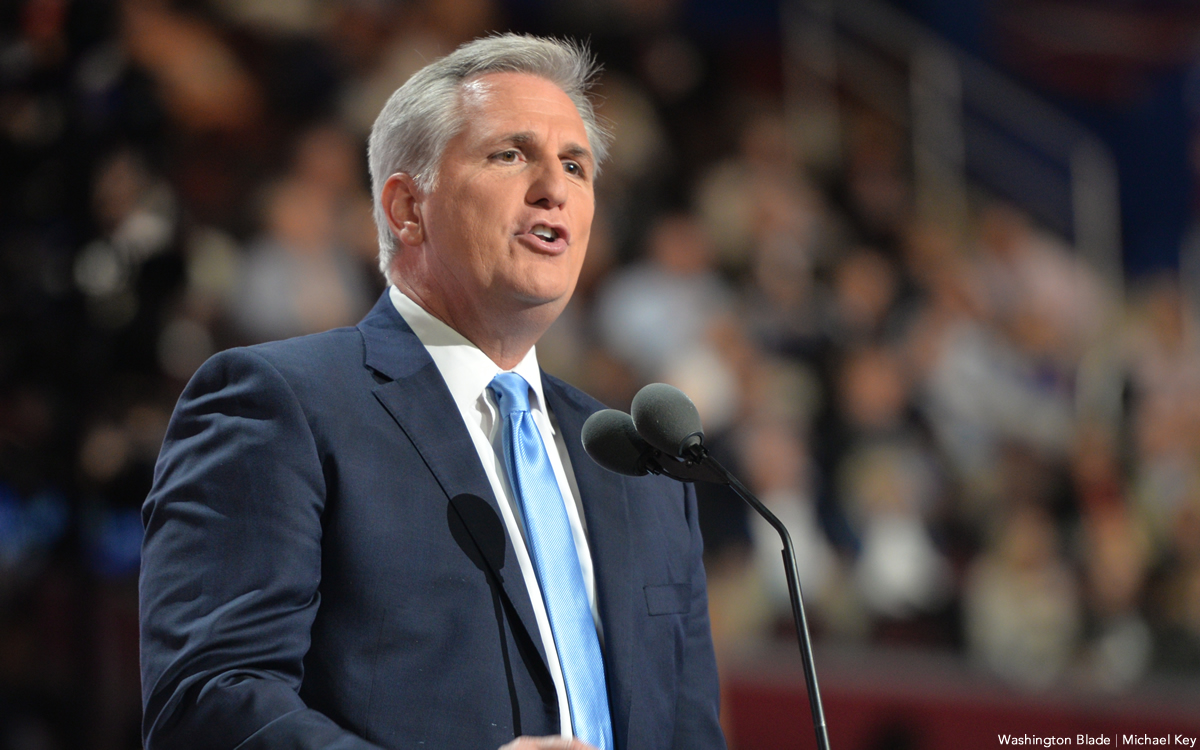Congress
McCarthy elected speaker after 4th day and the 15th ballot
“Our debates will be passionate but not personal” Speaker-elect McCarthy tells Democratic Minority Leader Hakeem Jeffries as he accepts gavel

In the final vote tally shortly after midnight on Saturday January 7, House Republican Leader Kevin McCarthy of California was elected Speaker with 216 votes followed by Democratic Minority Leader Hakeem Jeffries (N.Y.) with 211 and 6 lawmakers voting present, in the 15th and final ballot.
He was sworn in at 1:40 AM Eastern and in turn Speaker McCarthy then swore in the assembled members of the 118th Congress en masse. Afterwards the Democratic and Republican conferences appointed their leadership roles and House officers including the Clerk of the House and the House Sergeant-at-Arms who were also sworn in.
The House adjourned at 1:54 a.m. Saturday and is set to reconvene on Monday at 5 p.m. ET.
McCarthy was initially stymied again in his quest to be speaker Friday evening as the 14th floor vote was held in the chamber and it became apparent he had once again not garnered the requisite votes needed.

After two key Republican holdouts voted present to lower the tally McCarthy would need to get the gavel, a visibly angry McCarthy strode to the back of the chamber to confront Florida Congressman Matt Gaetz, who was seated with Colorado Rep. Lauren Boebert and some of the other holdouts who had vocally opposed his speakership.
Wow McCarthy goes right to Gaetz and this conversation didn’t end well pic.twitter.com/Nbh6PdA40P
— Acyn (@Acyn) January 7, 2023
At one point, someone was heard to shout at the two lawmakers: “Stay civil!” Meanwhile, Alabama Rep. Mike Rogers had to be physically restrained from attacking Gaetz by Rep. Richard Hudson (R-N.C.) and others.

There was a motion to adjourn, which initially had enough votes to carry, but was ultimately defeated. The clerk of the House, Cheryl L. Johnson, commenced the fifteenth voice roll call vote after McCarthy’s name was again put forward.
During the vote, U.S. Rep. Stephanie Bice (R-Okla.) shouted: “For the 15th and final goddamn time, Kevin McCarthy”
The final path to the speaker’s chair occurred as Gaetz and Boebert, joined by other McCarthy opponents, voted present.
McCarthy’s victory required him and his allies to make extraordinary concessions to the bloc of far-right holdouts.
These included changes to House rules that empowered the House Freedom Caucus, and a new rules package. CNN reported that package included:
- Any member can call for a motion to vacate the speaker’s chair – this is significant because it would make it much easier than it is currently to trigger what is effectively a no confidence vote in the speaker. Conservatives pushed hard for this, while moderates are worried it will weaken McCarthy’s hand.
- A McCarthy-aligned super PAC agreed to not play in open Republican primaries in safe seats
- The House will hold votes on key conservative bills, including a balanced budget amendment, congressional term limits and border security
- Efforts to raise the nation’s debt ceiling must be paired with spending cuts. This could become a major issue in the future when it is time to raise the debt limit to avoid a catastrophic default because Democrats in the Senate and the White House would likely oppose demands for spending cuts
- Move 12 appropriations bills individually. Instead of passing separate bills to fund government operations, Congress frequently passes a massive year-end spending package known as an “omnibus” that rolls everything into one bill. Conservatives rail against this, arguing that it evades oversight and allows lawmakers to stick in extraneous pet projects.
- More Freedom Caucus representation on committees, including the powerful House Rules Committee
- Cap discretionary spending at fiscal 2022 levels, which would amount to lower levels for defense and domestic programs
- 72 hours to review bills before they come to floor
- Give members the ability to offer more amendments on the House floor
- Create an investigative committee to probe the “weaponization” of the federal government
- Restore the Holman rule, which can be used to reduce the salary of government officials
The White House released a statement from President Joe Biden:
“Jill and I congratulate Kevin McCarthy on his election as speaker of the House. The American people expect their leaders to govern in a way that puts their needs above all else, and that is what we need to do now.
As I said after the midterms, I am prepared to work with Republicans when I can and voters made clear that they expect Republicans to be prepared to work with me as well. Now that the leadership of the House of Representatives has been decided it is time for that process to begin.”
It was the first time in a century that the gavel was not passed with the first ballot, paralyzing the House as new lawmakers could not be seated and activity like committee assignments and legislation was ground to a halt.
McCarthy had faced an obstinate group of about 20 hardline GOP members, despite having won the endorsement of influential conservative media figures, former president Donald Trump, and ultraconservative members of the conference like U.S. Rep. Marjorie Taylor Greene (Ga.).
Signs that the dam was breaking began to emerge Friday amid reporting that the Republican leader made more concessions, such as by agreeing to a rules change that would allow for any GOP member to call for a vote to vacate the speakership at any time and for any reason.
Partly as a consequence of the conditions to which he agreed to earn their support, McCarthy’s autonomy over the gavel is expected to be compromised by the ultraconservative faction of the House GOP caucus whose power was just demonstrated during the speakership election.
McCarthy has long been an opponent of LGBTQ rights. The Republican Leader cosigned the House GOP’s legal defense of the Defense of Marriage Act during the Obama administration in 2011, later co-authoring an amicus brief supporting the legislation to the U.S. Supreme Court.
More recently, in 2022 McCarthy voted against the Respect for Marriage Act, which codifies key protections for LGBTQ people as a safeguard if the Supreme Court overturns or weakens the constitutional right to same-sex marriage.
The Human Rights Campaign awards McCarthy a score of “0” for his record in the legislature.
Congress
Congress passes ‘Big, Beautiful Bill’ with massive cuts to health insurance coverage
Roughly 1.8 million LGBTQ Americans rely on Medicaid

The “Big, Beautiful Bill” heads to President Donald Trump’s desk following the vote by the Republican majority in the U.S. House of Representatives Thursday, which saw two nays from GOP members and unified opposition from the entire Democratic caucus.
To partially offset the cost of tax breaks that disproportionately favor the wealthy, the bill contains massive cuts to Medicaid and social safety net programs like food assistance for the poor while adding a projected $3.3 billion to the deficit.
Policy wise, the signature legislation of Trump’s second term rolls back clean energy tax credits passed under the Biden-Harris administration while beefing up funding for defense and border security.
Roughly 13 percent of LGBTQ adults in the U.S., about 1.8 million people, rely on Medicaid as their primary health insurer, compared to seven percent of non-LGBTQ adults, according to the UCLA School of Law’s Williams Institute think tank on sexual orientation and gender identities.
In total, the Congressional Budget Office estimates the cuts will cause more than 10 million Americans to lose their coverage under Medicaid and anywhere from three to five million to lose their care under Affordable Care Act marketplace plans.
A number of Republicans in the House and Senate opposed the bill reasoning that they might face political consequences for taking away access to healthcare for, particularly, low-income Americans who rely on Medicaid. Poorer voters flocked to Trump in last year’s presidential election, exit polls show.
A provision that would have blocked the use of federal funds to reimburse medical care for transgender youth was blocked by the Senate Parliamentarian and ultimately struck from the legislation — reportedly after the first trans member of Congress, U.S. Rep. Sarah McBride (D-Del.) and the first lesbian U.S. senator, Tammy Baldwin (D-Wis.), shored up unified opposition to the proposal among Congressional Democrats.
Congress
Ritchie Torres says he is unlikely to run for NY governor
One poll showed gay Democratic congressman nearly tied with Kathy Hochul

Gay Democratic Congressman Ritchie Torres of New York is unlikely to challenge New York Gov. Kathy Hochul (D) in the state’s next gubernatorial race, he said during an appearance Wednesday on MSNBC’s “Morning Joe.”
“I’m unlikely to run for governor,” he said. ““I feel like the assault that we’ve seen on the social safety net in the Bronx is so unprecedented. It’s so overwhelming that I’m going to keep my focus on Washington, D.C.”
Torres and Hochul were nearly tied in a poll this spring of likely Democratic voters in New York City, fueling speculation that the congressman might run. A Siena College poll, however, found Hochul leading with a wider margin.
Back in D.C., the congressman and his colleagues are unified in their opposition to President Donald Trump’s signature legislation, the “Big Beautiful Bill,” which heads back to the House after passing the Senate by one vote this week.
To pay for tax cuts that disproportionately advantage the ultra-wealthy and large corporations, the president and Congressional Republicans have proposed massive cuts to Medicaid and other social programs.
A provision in the Senate version of the bill that would have blocked the use of federal funds to reimburse medical care for transgender youth was blocked by the Senate Parliamentarian and ultimately struck from the legislation, reportedly after pressure from transgender U.S. Rep. Sarah McBride (D-Del.) and lesbian U.S. Sen. Tammy Baldwin (D-Wis.).
Torres on “Morning Joe” said, “The so-called Big Beautiful Bill represents a betrayal of the working people of America and nowhere more so than in the Bronx,” adding, “It’s going to destabilize every health care provider, every hospital.”
Congress
House Democrats oppose Bessent’s removal of SOGI from discrimination complaint forms
Congressional Equality Caucus sharply criticized move

A letter issued last week by a group of House Democrats objects to Treasury Secretary Scott Bessent’s removal of sexual orientation and gender identity as bases for sex discrimination complaints in several Equal Employment Opportunity forms.
Bessent, who is gay, is the highest ranking openly LGBTQ official in American history and the second out Cabinet member next to Pete Buttigieg, who served as transportation secretary during the Biden-Harris administration.
The signatories to the letter include a few out members of Congress, Congressional Equality Caucus chair and co-chairs Mark Takano (Calif.), Ritchie Torres (N.Y.), and Becca Balint (Vt.), along with U.S. Reps. Nikema Williams (Ga.), Hank Johnson (Ga.), Raja Krishnamoorthi (Ill.), Delia Ramirez (Ill.), Joyce Beatty (Ohio), Lloyd Doggett (Texas), Eleanor Holmes Norton (D.C.), Josh Gottheimer (N.J.), and Sylvia Garcia (D-Texas).
The letter explains the “critical role” played by the EEO given the strictures and limits on how federal employees can find recourse for unlawful workplace discrimination — namely, without the ability to file complaints directly with the Employment Opportunity Commission or otherwise engage with the agency unless the complainant “appeal[s] an agency’s decision following the agency’s investigation or request[s] a hearing before an administrative judge.”
“Your attempt to remove ‘gender identity’ and ‘sexual orientation’ as bases for sex discrimination complaints in numerous Equal Employment Opportunity (EEO) forms will create unnecessary hurdles to employees filing EEO complaints and undermine enforcement of federal employee’s nondiscrimination protections,” the members wrote in their letter.
They further explain the legal basis behind LGBTQ inclusive nondiscrimination protections for federal employees in the EEOC’s decisions in Macy v. Holder (2012) and Baldwin v. Foxx (2015) and the U.S. Supreme Court’s decision in Bostock v. Clayton County (2020).
“It appears that these changes may be an attempt by the department to dissuade employees from reporting gender identity and sexual orientation discrimination,” the lawmakers wrote. “Without forms clearly enumerating gender identity and sexual orientation as forms of sex discrimination, the average employee who experiences these forms of discrimination may see these forms and not realize that the discrimination they experienced was unlawful and something that they can report and seek recourse for.”
“A more alarming view would be that the department no longer plans to fulfill its legal obligations to investigate complaints of gender identity and sexual orientation and ensure its
employees are working in an environment free from these forms of discrimination,” they added.
-

 U.S. Supreme Court2 days ago
U.S. Supreme Court2 days agoSupreme Court to consider bans on trans athletes in school sports
-

 Out & About2 days ago
Out & About2 days agoCelebrate the Fourth of July the gay way!
-

 Virginia2 days ago
Virginia2 days agoVa. court allows conversion therapy despite law banning it
-

 Maryland5 days ago
Maryland5 days agoLGBTQ suicide prevention hotline option is going away. Here’s where else to go in Md.









